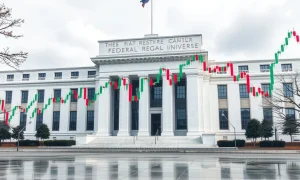In a groundbreaking move that challenges traditional real estate norms, prominent investor Grant Cardone has listed his $43 million Miami oceanfront mansion exclusively for Bitcoin, marking one of the most significant cryptocurrency real estate transactions to date. This bold decision tests Bitcoin’s viability as both a store of value and medium of exchange for high-value assets.
Bitcoin Real Estate Transaction Details
Grant Cardone priced his 13,000 square foot Golden Beach property at exactly 400 Bitcoin. The luxury mansion features seven bedrooms and twelve bathrooms. Additionally, it includes an infinity pool and private beachfront cabana. The property was designed by renowned interior designer Martyn Lawrence Bullard. This Bitcoin real estate listing represents a strategic shift in high-end property marketing.
Market Implications of Bitcoin Real Estate
This transaction demonstrates Bitcoin’s growing acceptance in traditional markets. The cryptocurrency has appreciated approximately 80% annually. Consequently, 400 Bitcoin now equals $43 million compared to $1.5 million five years ago. This Bitcoin real estate deal highlights the digital asset’s potential as an inflation hedge. Moreover, it signals increasing institutional confidence in cryptocurrency transactions.
Technical Execution Through Propy
The listing utilizes Propy’s blockchain-based real estate platform. This technology enables secure cryptocurrency transactions for property sales. The platform streamlines traditional closing processes significantly. Furthermore, it provides transparent transaction records on the blockchain. This Bitcoin real estate transaction could establish new industry standards.
Investment Strategy Considerations
Potential buyers must evaluate several key factors:
• Portfolio diversification benefits of tangible versus digital assets
• Tax implications of large cryptocurrency transactions
• Market timing considerations regarding Bitcoin’s volatility
• Long-term value preservation strategies
Industry Impact and Future Outlook
This Bitcoin real estate listing could influence broader market trends. High-profile transactions often drive institutional adoption patterns. The real estate industry increasingly explores cryptocurrency integration. Additionally, social media platforms facilitate unconventional property marketing. This deal may inspire similar Bitcoin real estate initiatives globally.
Frequently Asked Questions
How does purchasing property with Bitcoin work technically?
Buyers transfer Bitcoin to a secure escrow service specializing in cryptocurrency real estate transactions. The platform converts funds to fiat currency or facilitates direct transfer, depending on seller preferences and local regulations.
What are the tax implications of buying property with Bitcoin?
Most jurisdictions treat Bitcoin spending as a taxable event. Users must report capital gains or losses based on their cryptocurrency’s acquisition cost versus spending value. Consult tax professionals for specific guidance.
Why would sellers accept Bitcoin given its price volatility?
Sellers might believe in Bitcoin’s long-term appreciation potential or want to attract cryptocurrency-rich buyers. Some immediately convert proceeds to stablecoins or fiat currency to minimize volatility exposure.
Are Bitcoin real estate transactions legally binding?
Yes, when properly structured through licensed real estate platforms and legal professionals. Contracts must comply with local real estate laws and cryptocurrency regulations, which vary by jurisdiction.
How common are Bitcoin real estate transactions currently?
While growing, they remain relatively rare, particularly for high-value properties. Most transactions occur in cryptocurrency-friendly jurisdictions with clear regulatory frameworks.
What happens if Bitcoin’s price changes during transaction processing?
Reputable platforms typically use price stabilization mechanisms or escrow services that adjust final settlement amounts based on predetermined formulas to protect both parties.








